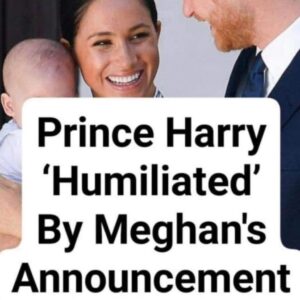The passing of Queen Elizabeth meant that her son, King Charles III acceded the throne and Britain witnessed a coronation taking place after over 70 years. However, the loss of the Queen has also brought some significant changes withing the royal family.
Meghan Markle and Prince Harry’s children, Archie and Lilibet Diana, received the titles of Prince and Princess. This came as a surprise to many as one of the reason for the Sussex’s departure from the Firm was that they wanted to lead a more quieter lives. At the same time, they believed that these titles could be a burden to their children, but then they changed their mind.
The announcement about the new titles came shortly after Lili’s christening, and according to Harry and Meghan, this is their children’s birthright.
“The children’s titles have been a birthright since their grandfather became monarch. This matter has been settled for some time in alignment with Buckingham Palace,” a spokesman for the couple said.

The Royal Family’s website has been updated accordingly, and Master Archie Mountbatten-Windsor and Miss Lilibet Mountbatten-Windsor were listed as Prince and Princess in the line of succession.
Many have been left puzzled as to why Archie and Lilibet got to receive the titles of Prince and Princess, but the explanation is in fact a very simple one.
In 1917, George V created the rules that are still in place today. He decided that the children of the sons of any Sovereign “shall have and at all times hold and enjoy the style title or attribute of Royal Highness with their titular dignity of Prince or Princess prefixed to their respective Christian names or with their other titles of honor.” So, when the Queen passed and King Charles became the monarch, Archie and Lilibet became eligible for their own royal titles. “It wasn’t clear if they would use them or not since Harry and Meghan have left the family as working royals and headed to the States,” TalkTV Royal Editor Sarah Hewson told Sky. “We understand discussions took place after the Queen’s funeral and it has been agreed that they will be known formally as prince and princess – although Harry and Meghan won’t be using it in everyday life.”
The decision to accept the titles for their children, which are their birth right, wasn’t embraced by everyone.
Royal expert Angela Levin argued that it might have an unwanted impact on Archie and Lilibet’s futures.
“It will take a long time for little Lilibet to realise the extent of the burden her parents have placed on her young shoulders,” Levin told Sky News. She added that by giving their daughter a princess title, Harry and Meghan have now “glued her to the British Royal Family,” the same establishment they have criticized for many years.
“Why on earth would you want your daughter to experience such anguish?” Angela Levin said, adding that Lilibet’s everyday life will be more challenging since she has the princess title attached to her name.”
“Little girls obviously love being a princess at parties, but if Lilibet is the only one in the class who is a real princess, it could lead to jealousy that could easily be avoided,” the royal expert concluded.

Others believe that Harry and Meghan could benefit financially from their children’s titles.
“You wouldn’t be wrong if you look at this and think about the branding,” Sarah Hewson said. “When they said they wanted to distance themselves from the family, they wanted to have a private life, when Archie was born, I remember vividly being told they wanted him to be Master Archie, now he is Prince, and Lilibet is Princess,” Hewson added.
Mere days after Lilibet and Archie’s titles were officially added to the Buckingham Palace website, King Charles announced another big change within the Royal Family.

Prince Edward, his youngest brother, who held the titled the Earl of Wessex, was honored with a new title: the Duke of Edinburgh.
A palace statement said: “His Majesty the King has been pleased to confer the Dukedom of Edinburgh upon the Prince Edward, Earl of Wessex and Forfar, on the occasion of His Royal Highness’s 59th birthday. The title will be held by Prince Edward for His Royal Highness’s lifetime.”
“The Dukedom was last created for Prince Philip in 1947, upon his marriage to Princess Elizabeth, who held the title of Duchess of Edinburgh before acceding to the throne in 1952. The new Duke and Duchess of Edinburgh are proud to continue Prince Philip’s legacy of promoting opportunities for young people of all backgrounds to reach their full potential.”

What experts noticed was that the contrast between the announcements regarding the new titles given to Harry and Meghan’s children and that to Prince Edward was ‘stark.’
“The contrast between the way in which Harry and Meghan released the news of their children’s royal titles and the way King Charles announced his brother’s ennoblement was stark,” Seward told the Mirror.“King Charles issued a formal statement from Buckingham Palace to say he was ‘pleased’ to confer the Dukedom of Edinburgh upon The Prince Edward, Earl of Wessex and Forfar,” the royal expert added. “It was such a grand announcement it felt as if it were in a gilded frame pinned to the Buckingham Palace railings.”





